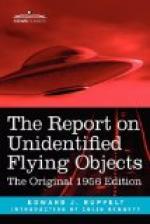To further explain my point, I drew a sketch on a blackboard. Suppose that a UFO is reported over a fair-sized city. Now we may get one or two reports, and these reports may be rather sketchy. This does us no good—all we can conclude is that somebody saw something that he couldn’t identify. But suppose fifty people from all over the city report the UFO. Then it would be profitable for us to go out and talk to these people, find out the time they saw the UFO, and where they saw it (the direction and height above the horizon). Then we might be able to use these data, work out a triangulation problem, and get a fairly accurate measurement of speed, altitude, and size.
Radar, of course, will give an accurate measurement of speed and altitude, I pointed out, but radar is not infallible. There is always the problem of weather. To get accurate radar data on a UFO, it is always necessary to prove that it wasn’t weather that was causing the target. Radar is valuable, and we wanted radar reports, I said, but they should be considered only as a parallel effort and shouldn’t take the place of visual sightings.
In winding up my briefing, I again stressed the point that, as of the end of 1951—the date of this briefing—there was no positive proof that any craft foreign to our knowledge existed. All recommendations for the reorganization of Project Grudge were based solely upon the fact that there were many incredible reports of UFO’s from many very reliable people. But they were still just flying saucer reports and couldn’t be considered scientific proof.
Everyone present at the meeting agreed—each had read or had been briefed on these incredible reports. In fact, two of the people present had seen UFO’s.
Before the meeting adjourned, Colonel Dunn had one last question. He knew the answer, but he wanted it confirmed. “Does the United States have a secret weapon that is being reported as a UFO?”
The answer was a flat “No.”
In a few days I was notified that my plan had been given the green light. I already had the plan written up in the form of a staff study so I sent it through channels for formal approval.
It had been obvious right from the start of the reorganization of Project Grudge that there would be questions that no one on my staff was technically competent to answer. To have a fully staffed project, I’d need an astronomer, a physicist, a chemist, a mathematician, a psychologist, and probably a dozen other specialists. It was, of course, impossible to have all of these people on my staff, so I decided to do the next best thing. I would set up a contract with some research organization who already had such people on their staff; then I would call on them whenever their services were needed.
I soon found a place that was interested in such a contract, and the day after Christmas, Colonel S. H. Kirkland, of Colonel Dunn’s staff, and I left Dayton for a two-day conference with these people to outline what we wanted. Their organization cannot be identified by name because they are doing other highly secret work for the government. I’ll call them Project Bear.




